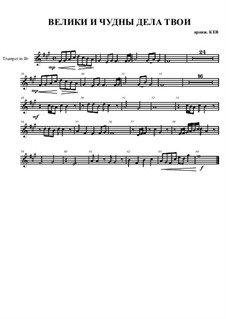Veliki I Chudni Dela Tvoi Noti Dlya Fortepiano
Josh: When I was growing up, the best way to judge if I really liked a new movie in theaters was if I wanted to see it more than once. My parents were not so patient as to let me drag them to the theaters to see The Mighty Ducks or Aladdin or The Sandlot multiple times—that was what my aunt was for. She was so happy to spend time with me that I could induce her to take me to the local General Cinema—remember General Cinema? I remember General Cinema—to see whatever movie I’d fallen in love with that week or month. Now, I’m an adult with a 2-year-old son who’s not yet able to sit still to watch a feature-length film in theaters, though my wife and I have certainly tried. He lasted through an hour of Inside Out and only about 25 minutes of Finding Dory. However, we do let him watch appropriate movies and TV at home via our Apple TV if he’s in the mood.
Dve basni I.A. Krylova: dli︠a︡ met︠s︡t︠s︡o-soprano, zhenskogo khora i fortepiano, soch. 4(a); Dva romansa na slova M.I︠U︡. Lermontova: dli︠a︡. Pre hacked dotnetfx45full setupexe free download.
I tell a lie—I say “movies,” when I should really say “movie.” There’s only one movie our son wants to watch, morning, noon, or night. I wouldn’t have guessed when I saw the film by myself earlier this year how obsessed he would become with Zootopia. I enjoyed the film a great deal and walked out thinking that my wife would at least enjoy it. When the film was released on home video, I felt like rewatching in part to see if I would still dig the film as much as I did earlier in the year.
Since then, I’ve probably seen Zootopia, in part or in full, 50 times. This may be an understatement. Our son first saw it on a vacation in early June, and watched it again three more times before the week was over. Oliver’s at the age where he wants to watch the same thing, or same group of things, over and over and over and over again.
I know he’ll grow out of it one day—at least he’ll age out of watching shows on Disney Junior. Zootopia is meant to be enjoyed by a wide range of audience members: toddler, adult, or somewhere in between. So I hope Oliver, as much as he enjoys what he calls “bunny movie” now, will move past it to something else in the months and years to come. But Tom, I know your daughter is older than my son—am I being laughably hopeful to presume that he might move onto something, anything else? Tom: The good news, Josh, is that he will move onto something else. The bad news is that he’ll be just as obsessed with the next thing as he is with the current one. My daughter is about a year older than your son, and is now able to (more or less) sit through a 70-minute animated feature.
Over the summer, we cycled through a number of Disney movies that she decided, for a couple of weeks at a time each, was the only movie, and would watch it as obsessively as your son watches Zootopia. There was The Many Adventures of Winnie the Pooh for a long while, followed by an intense, months-long binge watch of Cinderella, then Tangled, and in the last week, suddenly it has become The Little Mermaid.
There’s a couple of reactions I have to all this. First, yeah, my daughter probably watches too much television, so if you’d like to complain, you can write to. Second, I’ve come to understand a vital part of the modern parenting experience is a constant, unyielding exposure to a cultural universe that is not your own, but which you must learn to either enjoy or endure. (I’m sure we could easily write this same column about books or songs as well.) My third reaction to all this binge-watching, though, is one that probably would not be universally shared (except perhaps among readers of this site): my surprise at the ways I ended up thinking about these movies critically.
After about the 20th time I saw Cinderella this summer, I realized that my inclination to view movies through a critical lens was warping not just the way I saw that movie, but all movies. In particular, I’ve become obsessed with very little moments, trying to think about how and why those moments work (or don’t) and what they say about the rest of the picture. Of course, this is pretty common practice across various forms of criticism, from academia down to the lowliest tweet. We like to use a single shot, or music cue, or gesture as a synecdoche for the whole movie and talk about what this small thing means to the big picture.
